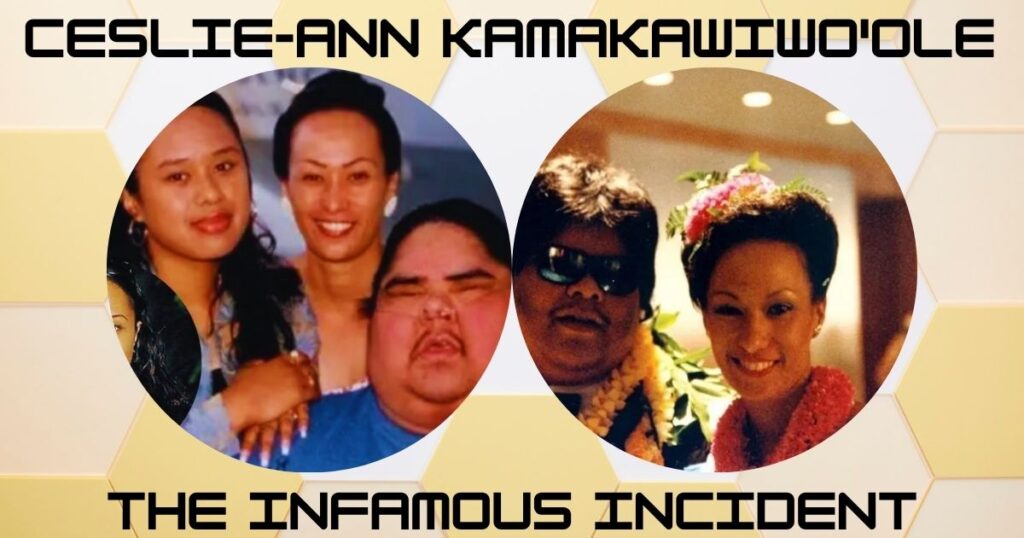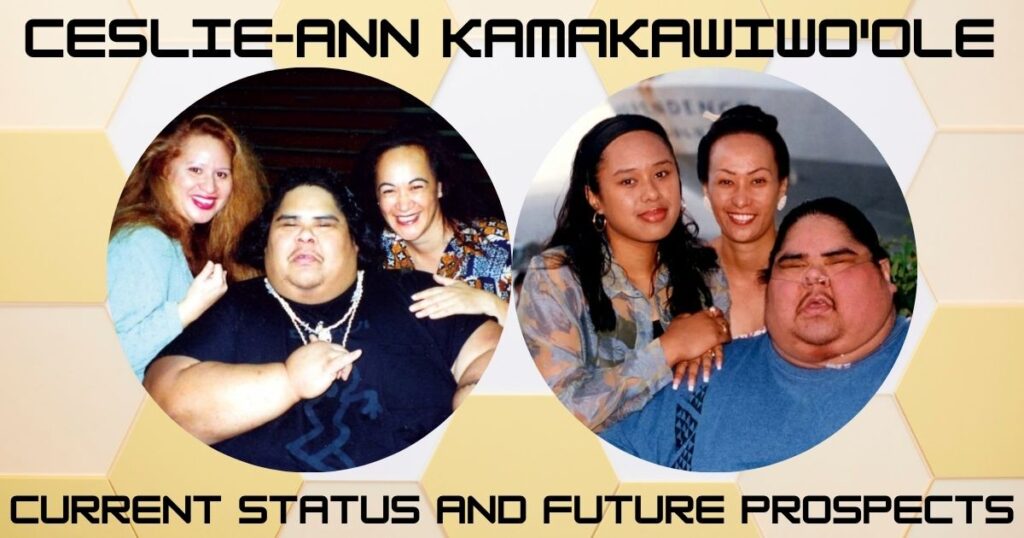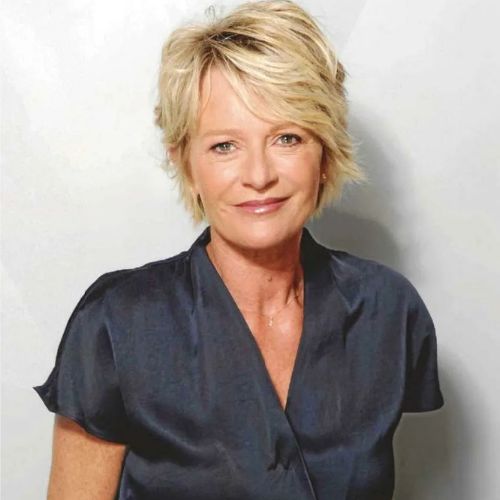The haunting melody of “Somewhere Over the Rainbow/What a Wonderful World” still echoes across beaches worldwide. The Voice of Hawaii, Israel Kamakawiwo’ole, gave us that gift. But his daughter’s story? That’s something most people don’t know.
Ceslie-Ann Kamakawiwo’ole sometimes known as Wehi Kamakawiwo’ole lived a life dramatically different from her father’s beloved legacy. Her journey took turns nobody expected. February 25, 2015, changed everything for this Israel Kamakawiwo’ole daughter.
Who is Ceslie-Ann Kamakawiwo’ole?
Born in 1983, Ceslie-Ann grew up as Hawaiian royalty’s child. Her father wasn’t just any musician. The Hawaiian musician Israel Kamakawiwo’ole became an international sensation during the 1990s. His daughter carried that weight daily.
Growing up Kamakawiwo’ole meant constant attention. People recognized the name immediately. They expected greatness. They wanted another legend. That pressure? It crushes some people.
Her Ceslie-Ann Kamakawiwoole early life included both privilege and pain. She watched her father’s health deteriorate. She saw fame’s dark side. By 1997, when Israel passed away, she was just fourteen.
Early Life and Family Background
The Ceslie-Ann Kamakawiwoole family background tells a complicated story. Israel and Marlene Kamakawiwo’ole married on September 18, 1982. Their relationship brought Ceslie-Ann into a world where Hawaiian culture and music were everything.
| Family Member | Role | Impact on Ceslie-Ann |
|---|---|---|
| Israel Kamakawiwo’ole | Father | Musical legacy, early death (1997) |
| Marlene Kamakawiwo’ole | Mother | Primary caregiver, support system |
| Betty Stickney | Family friend | Community connection |
Life wasn’t always easy, though. Despite her father’s success, financial struggles persisted. The Israel Kamakawiwoole legacy didn’t translate to wealth. It meant expectations without resources.
Losing her father at fourteen devastated Ceslie-Ann. She lost her anchor. Hawaii’s tight-knit community tried helping. But grief doesn’t follow schedules.
The Infamous Incident

February 25, 2015, started like any other day. By evening, everything changed. A car theft on Ala Wai Boulevard would put Ceslie-Ann Kamakawiwoole on Hawaii’s Most Wanted list.
The owner discovered their vehicle missing around 7:00 am. Police received notification at 3:20 pm. Security footage showed something troubling. At 4:00 pm, cameras caught Ceslie-Ann entering the stolen vehicle.
This wasn’t just any Hawaii car theft case. The suspect’s last name made headlines instantly. Grand theft auto charges followed quickly. So did warrants for her arrest.
She disappeared. Authorities issued a $20,000 warrant. The Ceslie-Ann Kamakawiwoole arrest became Hawaii’s most talked-about manhunt that year.
Legal Troubles and Most Wanted Status
The Ceslie-Ann Kamakawiwoole legal troubles extended beyond car theft. Drug possession charges added complexity. She’d violated her HOPE probation program Hawaii terms previously.
HOPE (Hawaii’s Opportunity Probation with Enforcement) is strict. It demands immediate compliance. One violation means consequences. Multiple violations? That’s serious trouble.
Her placement on the Ceslie-Ann Kamakawiwoole most wanted list shocked many. Some defended her. Others demanded justice immediately. KHON2 news covered developments constantly.
“This case represents the complexity of fame’s aftermath,” one local attorney noted. “Children of famous musicians often struggle with impossible expectations.”
The public reaction to Ceslie-Ann Kamakawiwoole split communities. Should her father’s legacy grant sympathy? Or should accountability remain absolute?
The Arrest and Aftermath
August 7, 2016, brought resolution. Live footage aired showing the Ceslie-Ann Kamakawiwoole arrest. She’d evaded authorities for over a year. That changed everything legally.
Court proceedings revealed her desperate circumstances. She faced multiple charges now:
- Grand theft auto
- Drug possession
- Probation violation
- Failure to appear
Each charge carried serious penalties. Combined? They threatened years behind bars.
Sentencing reflected both accountability and circumstances. The judge acknowledged her Ceslie-Ann Kamakawiwoole personal struggles. Mental health issues. Substance abuse. Unresolved grief.
Personal Life and Struggles
Understanding Ceslie-Ann requires looking beyond headlines. Her Ceslie-Ann Kamakawiwoole biography reveals layers of trauma. Losing Israel at fourteen started everything.
Mental health and fame create toxic combinations. She needed support. Hawaii’s resources were limited then. Stigma prevented many from seeking help.
The pressure of being an Israel Kamakawiwo’ole daughter never stopped. People constantly compared her to him. They wanted her to embody aloha like he did.
Key struggles she faced:
- Unprocessed grief from father’s death
- Substance abuse issues
- Economic instability
- Public scrutiny and pressure
- Limited mental health resources
- Cultural expectations
Family friend Betty Stickney once said the family tried everything. Sometimes love isn’t enough. Professional intervention needed to happen earlier.
The Impact on Her Father’s Legacy
Did Ceslie-Ann’s actions tarnish the Israel Kamakawiwoole legacy? Most Hawaiians say no. They separate artist from family.
His music still plays everywhere. Weddings. Funerals. Commercials. Movies. “Somewhere Over the Rainbow Hawaii” remains untouchable. His message of peace endures.
The Voice of Hawaii belongs to everyone now. His daughter’s choices don’t diminish his contributions. That’s how legacy works. It transcends individual family members.
Seeking Understanding and Lessons
The Ceslie-Ann Kamakawiwoole redemption story teaches us crucial lessons:
We must support at-risk youth earlier. Warning signs appeared long before 2015. Intervention could have changed everything.
Children of celebrities face unique pressures. They inherit fame without consent. Society expects greatness automatically.
Mental health resources matter desperately. Hawaii has improved since then. But gaps still exist.
Understanding doesn’t mean excusing. It means recognizing complexity. It means learning from tragedy.
The Aftermath and Public Reaction
The Ceslie-Ann Kamakawiwoole arrest sent shockwaves through Hawaii’s islands. Social media exploded immediately. KHON2 news coverage dominated local television. Everyone had opinions about the Israel Kamakawiwo’ole daughter’s situation.
Public reaction to Ceslie-Ann Kamakawiwoole split dramatically down the middle.
Some community members defended her fiercely. They pointed to her tragic Ceslie-Ann Kamakawiwoole early life. Losing a father at fourteen. Growing up without proper mental health support. Economic struggles despite the famous name.
“She’s not her father’s music,” one local resident told reporters. “She’s a hurting woman who needed help years ago.”
Others demanded full accountability regardless of circumstances. The victim deserved justice. Hawaiian celebrity scandals shouldn’t receive special treatment. Her last name didn’t grant immunity.
Public ResponsePercentageMain ArgumentsSympathetic~40%Mental health, grief, lack of supportCritical~45%Accountability, victim’s rights, no excusesNeutral/Unsure~15%Complex situation requiring nuance
Local Hawaiian culture and music communities struggled particularly. They wanted to protect the Israel Kamakawiwoole legacy. They also felt compassion for his daughter’s obvious pain.
Betty Stickney and other family friends spoke cautiously. They acknowledged the seriousness while asking for understanding. The Israel and Marlene Kamakawiwoole relationship had always prioritized ohana (family). But what happens when family members make destructive choices?
National outlets picked up the story quickly. Headlines focused on the dramatic contrast beloved musician’s troubled daughter. Children of famous musicians face scrutiny that most people never experience.
The victim in the Hawaii car theft case maintained relative silence publicly. Their recovery process continued privately. Victim advocacy groups emphasized that compassion for the perpetrator shouldn’t overshadow the harm caused.
Community healing efforts emerged slowly. Some churches offered prayer circles. Others organized discussions about supporting at-risk youth better. The conversation shifted from blame toward prevention.
The Ceslie-Ann Kamakawiwoole 2015 incident forced uncomfortable questions:
- Why did intervention fail earlier?
- What support systems were missing?
- How can Hawaii prevent similar situations?
- Should celebrity families receive different treatment?
Social media debates grew heated frequently. People argued about privilege versus struggle. Some pointed out that the Ceslie-Ann Kamakawiwoole family background included both fame and poverty. Others noted that many Hawaiians face worse circumstances without committing crimes.
“This isn’t about excusing behavior,” wrote one blogger. “It’s about understanding why people break. So we can help before they do.”
The HOPE probation program Hawaii came under scrutiny too. Had it failed her? Or had she failed it? Probation violation statistics showed her case wasn’t unique. Many struggled with the program’s strict requirements.
Current Status and Future Prospects

Where is Ceslie-Ann Kamakawiwoole now? The Ceslie-Ann Kamakawiwoole current status remains mostly private. She completed her legal obligations. Life after arrest Hawaii is challenging for anyone.
Reintegration takes time. It requires support. It demands genuine commitment to change.
Some reports suggest she’s rebuilding quietly. She’s avoided public attention. That’s probably wise. The Ceslie-Ann Kamakawiwoole family legacy deserves peace.
Lessons and Reflections
The Ceslie-Ann Kamakawiwoole redemption story still unfolding teaches us profound lessons about fame, family, and failure.
The Weight of Legacy
Children of celebrities inherit impossible burdens. They didn’t choose their parents’ fame. Yet society expects them to embody that greatness automatically. The pressure crushes some people entirely.
The Voice of Hawaii gave the world beauty. His daughter received expectations instead. That fundamental imbalance creates toxic environments for growth.
Key insight: Legacy belongs to the creator. Children deserve their own identities.
Mental Health Matters Desperately
Mental health and fame create dangerous combinations. Grief left untreated becomes destructive. Trauma without intervention festers for years.
Hawaii has improved its resources since 2015. But gaps still exist. Access remains limited for many. Stigma prevents people from seeking help.
“Early intervention saves lives,” mental health advocates emphasize. “We can’t wait until people are on most wanted lists.”
The Intersection of Poverty and Fame
The Ceslie-Ann Kamakawiwoole family legacy included cultural richness but financial struggle. Fame doesn’t equal wealth. Especially for Hawaiian artists who prioritized community over commerce.
This created unique pressures. She carried a famous name. She lacked financial security. That combination breeds desperation sometimes.
Community Responsibility
Hawaii’s tight-knit communities tried helping. But informal support isn’t enough always. Professional intervention requires funding. It requires accessibility. It requires eliminating shame.
What communities can do:
- Recognize warning signs earlier
- Create accessible mental health resources
- Eliminate stigma around seeking help
- Support at-risk youth proactively
- Develop intervention programs before crises
- Foster environments where struggling people can ask for help
Accountability with Compassion
Understanding someone’s pain doesn’t excuse harmful actions. The Ceslie-Ann Kamakawiwoole legal troubles required consequences. Justice matters for victims.
But punishment alone doesn’t heal. Rehabilitation requires genuine support. It demands addressing root causes. It means helping people rebuild.
The HOPE probation program Hawaii attempts this balance. Sometimes it works. Sometimes it doesn’t. Continuous improvement remains necessary.
Separating Individuals from Relatives
Society must learn this critical lesson: Judge people as individuals. Ceslie-Ann isn’t Israel. Her choices don’t diminish his contributions.
“Somewhere Over the Rainbow/What a Wonderful World” still moves millions. The Hawaiian musician Israel Kamakawiwo’ole’s message endures. His daughter’s struggles exist separately.
The Danger of Single Stories
The Ceslie-Ann Kamakawiwoole biography contains complexity. She’s not just “troubled celebrity daughter.” She’s a human being who experienced trauma, made mistakes, and hopefully grows.
Single narratives fail always. They reduce people to headlines. They ignore context without excusing behavior. They prevent learning.
Systemic Issues Matter
Her story reveals broader problems:
- Inadequate mental health infrastructure
- Economic inequality within famous families
- Limited support for grieving youth
- Gaps in rehabilitation programs
- Media sensationalism over substance
Addressing these issues helps everyone. Not just children of celebrities. Not just Hawaii. Everywhere.
Hope Remains Possible
Despite everything, the Ceslie-Ann Kamakawiwoole current status suggests hope. She completed her obligations. She’s attempting to rebuild privately. That’s meaningful progress.
Redemption isn’t linear. It requires time. It demands genuine change. It means making amends where possible.
FAQ’s
Who is Ceslie-Ann Kamakawiwo’ole?
She’s the daughter of legendary Hawaiian musician Israel Kamakawiwo’ole, born in 1983. Her life took a difficult path following her father’s death in 1997.
What did Ceslie-Ann Kamakawiwo’ole do?
In 2015, she was charged with grand theft auto, drug possession, and probation violations related to a car theft on Ala Wai Boulevard.
Where is Ceslie-Ann Kamakawiwo’ole today?
Her current status remains private. She completed legal obligations and appears to be living quietly away from public attention.
Did her actions affect Israel Kamakawiwo’ole’s legacy?
No. Hawaii’s community has largely separated her choices from her father’s enduring musical contributions and cultural impact.
Conclusion
Ceslie-Ann Kamakawiwo’ole’s story isn’t simple. It’s painfully human. She’s more than headlines. More than mistakes. She’s someone who struggled under impossible weight.
Her father gave the world beauty. She inherited expectations instead of tools. That doesn’t excuse her choices. But it explains them partially.
We can learn from this. We can demand better mental health support. We can recognize that fame’s shadow burns those caught beneath it.
The Voice of Hawaii still sings. His daughter still lives. Both truths coexist. That’s the complexity of life in shadows.

